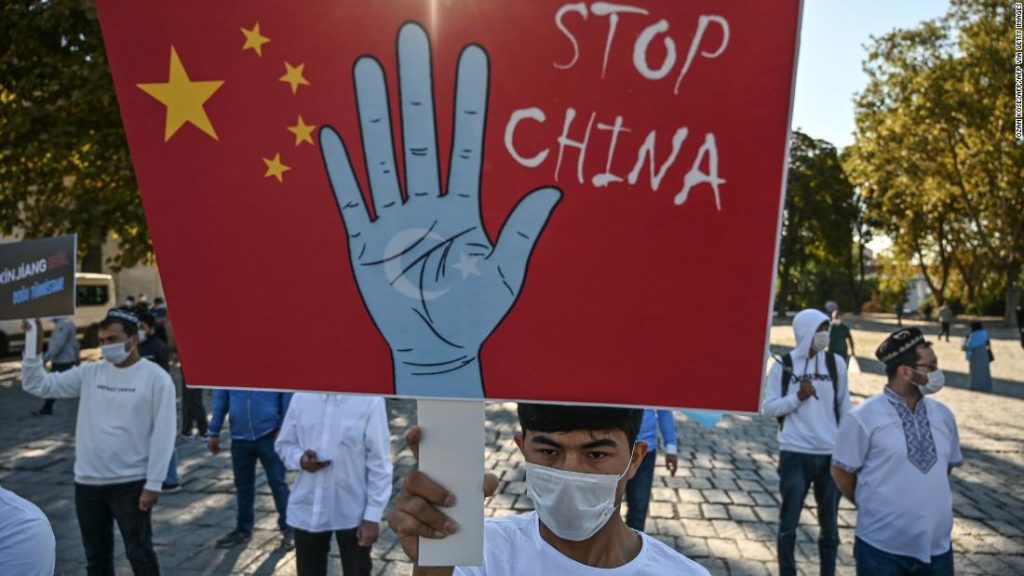As China is not a signatory to the Rome Statute, which established the ICC, prosecution at the court has always been a long shot. But activists had hoped to bring a case based on actions taken against Uyghurs living in Tajikistan and Cambodia, both of which are ICC members.
Bensouda’s office has left the file open, meaning the ICC could still pursue a case provided more evidence was presented.
Speaking to the Guardian, Rodney Dixon, the lead barrister in the attempted ICC case against China, said his team “will be providing highly relevant evidence … in the coming months.”
“We are engaging with the office of the prosecutor as these proceedings go on with the aim of opening a full investigation,” Dixon added.
The message is clear: while Bensouda’s decision may seem like a win of sorts for China, it highlights the growing pressure over Xinjiang and the determination of Uyghur groups and other activists to hold Beijing to account.
Leading that charge at an international level is Washington, where being tough on China is by now bipartisan consensus and
numerous hearings have been held on the situation in Xinjiang. US President Donald Trump has taken a hard line towards Beijing, and his government has
sanctioned multiple Chinese officials allegedly responsible for human rights abuses against Uyghurs.
Ahead of the US election last month, some activists had expressed concerns Joe Biden would take a softer approach. But in a
statement on Xinjiang, the now President-elect denounced the “unspeakable oppression” against Uyghurs and other ethnic minorities, which he said amounted to “genocide.”
Responding to those comments, Elijan Anayit, a spokesman for the Xinjiang government, said last month that claims of genocide were “a completely false proposition and a vicious attack on Xinjiang by overseas anti-China forces.”
Anayit pointed to the historic genocide of Indigenous Americans to argue the United States had no standing in this matter, and accused Washington of committing “a serious violation, sacrilege and manipulation” of the United Nations convention against genocide by targeting Beijing in this manner.
Yet while the US may have geopolitical motivations for holding China to account — and little room to argue the ICC decision, given Washington too
is not a signatory to the Rome Statute and has even sanctioned Bensouda — it is not alone in speaking out over Xinjiang.
In a speech at the UN General Assembly in September, French President Emmanuel Macron
called for an official investigation into Xinjiang. European lawmakers have also pushed for concerted action over the issue, including
potential sanctions against Chinese officials.
“We will not hesitate to use our democratic clout and put these values of human rights high on the agenda in dialogues with our partners, just as we did at the two summits with Chinese leaders this year,” European Council President Charles Michel
said last month. “We devoted a substantial part of our discussions to the issues of the rule of law in Hong Kong and the protection of minorities in Xinjiang.”
The Inter-Parliamentary Alliance on China — a grouping of hundreds of lawmakers across Europe, North America, Africa, and Asia-Pacific — has also
lobbied for international action over Xinjiang, supporting the
case at the ICC and calling for a UN investigation into the matter.
The pressure comes with China’s global reputation plummeting in the wake of the coronavirus pandemic.
A Pew survey in October found that unfavorable views of China had reached historic highs in many countries, with a majority in all 14 countries polled expressing negative opinions of Beijing.
The most immediate effect of all this lobbying could be on international businesses that source materials and labor from Xinjiang.
According to a new report from Adrian Zenz, a leading scholar on the oppression of Uyghurs, Chinese government documents and media reports show that “hundreds of thousands of ethnic minority laborers in Xinjiang are being forced to pick cotton by hand through a coercive state-mandated labor transfer and ‘poverty alleviation’ scheme.”
Earlier this month, the US
blocked cotton imports from Xinjiang over forced labor concerns — allegations China has consistently denied. In his report, Zenz argued there was “evidence for coercive labor related to all cotton produced in Xinjiang,” and said “companies should be required to thoroughly investigate the role of Chinese cotton in their supply chains, even if any related production takes place outside China.”
Numerous major clothing retailers use cotton sourced from Xinjiang, and have already come under pressure for this practice. The latest findings could spark some to reevaluate their supply chains, or prompt other governments to take action and force companies’ hands.
The likelihood of growing international criticism having an effect on Beijing is far smaller, however.
In September, Chinese President Xi Jinping
defended his policies in Xinjiang as “completely correct.” And as the ICC decision this week shows, holding countries to account is often easier said than done.

